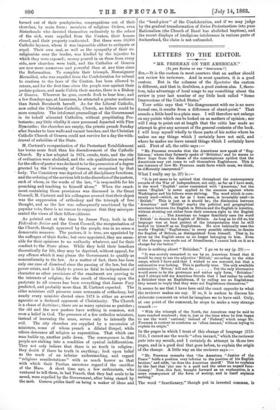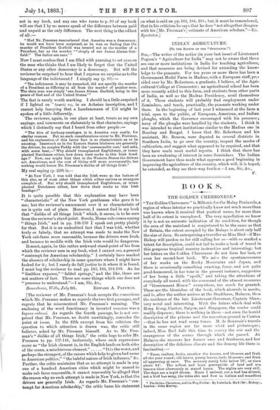LETTERS TO THE EDITOR.
"MR. FREEMAN ON THE AMERICAN."
LTO .THE EDITOR OF THE " SPECTATOE.1
Sia,—It is the custom in most quarters that an author shonld not review his reviewers. And in most quarters, it is a good custom. But in the columns of the Spectator the custom is different, and that is, doubtless, a good custom also. I, there- fore, take advantage of local usage to say something about the review in your last number of my little book called "Some Impressions of the United States."
Your critic says that " his disagreement with me is no mere formal one, it results from a difference of stand-point." That sounds a little hard to a plain man. I will therefore not enlarge on any points which can be looked on as matters of opinion ; nor will I stop to point out at length that the critic has made no attempt to give any account of the general contents of the book. I will keep myself wholly to those parts of his notice where he makes me say things which I certainly have not said, and where he makes me leave unsaid things which I certainly have said. First of all, the critic says :- " Mr. Freeman remarks that the Americans now speak of Eng- lishmen,' where they formerly spoke of Britisher,' and he seems to draw hope from the disuse of the contemptuous epithet that the Americans may yet come to call themselves Englishmen. This is one instance of how Mr. Freeman reads facts which must, we think, be differently interpreted."
What I really say (p. 27) is :— " It is yet more to be noticed that throughout the contemporary records of the War of Independence, not only, as far as I have seen, is the word 'English' never contrasted with American,' but the name 'English' is never applied to the enemies against whom Washington and his fellows were striving. The word which is com- monly used—which, as far as I have seen, is invariably used—is British." This is just as it should be; the distinction between American' and 'British' marks the political and geographical severance between the English in Britain and the English in America, without shutting out either from their common right to the English name The American no longer familiarly uses the word British' to denote the English of Britain. As long as he did so, his language was at least patient of the interpretation that he still looked on himself as an Englishman. He now habitually uses the words English," Englishman,' in every possible relation, to denote the English of Britain, as distinguished from himself. That is, he gives up the English name as no longer belonging to him. iven if the change was made out of friendliness, I cannot look on it as a change for the better."
Here is nothing about "Britisher." I go on to say (p. 29) :— " It was acutely remarked to me by an American friend that it would be easy to use the adjective British,' according to the older usage, which I have said that I wished to see restored, but that a substantive was lacking. This is perfectly true. The only available
substantive, Briton,' will not do Yet the only alternative would seem to be the grotesque and rather ugly form, ' Britisher.' And I always told my American friends that I had rather be called a Britisher than an Englishman, if by calling me an Englishman they meant to imply that they were not Englishmen themselves."
It seems to me that I have here said the exact opposite to what the reviewer makes me say. If so, it is useless to discuss his elaborate comment on what he imagines me to have said. Only, at one point of the comment, he stops to make a very strange remark :-
" With the triumph of the North, the American may be said to have reached manhood ; that is, just at the time when he first began to use the word national,' instead of 'Federal,' which usage Mr. Freeman is content to condemn as often inexact,' without trying to explain its origin."
In the pages in which I treat of this change of language (113- 114), I cannot see the words " often inexact," which the reviewer puts into my mouth, and I certainly do attempt in those two pages, and in good deal that goes before, to explain the origin of the change. A little way on the reviewer says :—
" Mr. Freeman remarks that 'the American "Justice of the Peace" holds a position very inferior to the position of his English brother,' and adds, `so does the American sheriff.' This he explains by the fact that ',the one is a paid and the other an unpaid func- tionary.' Now, this fact, brought forward as an explanation, is a mere consequence of the form of society, and in itself explains nothing."
The word " functionary," though put in inverted commas, is
not in my book, and any one who turns to p. 93 of my book will see that I by no means speak of the difference between paid and unpaid as the only difference. The next thing is the oddest of all :—
" Had Mr. Freeman remembered that America was a democracy, he would not have been surprised, as he was, on finding that the murder of President Garfield was treated not as the murder of a President, but as the murder "simply of one James Abram Gar- field." The italics are ours.' "
Now I must confess that I am filled with yearning to set eyes on the man who thinks that I am likely to forget that the United States or any other democracy is a democracy. But will the reviewer be surprised to hear that I express no surprise as to the language of the indictment ? I simply say (p. 96) :—
" The indictment. it may be remarked, did not specify the murder of a President as differing at all from the murder of another man. The slain man was simply one James Abram Garfield, being in the peace of God and of the United States.'"
The fact is surely worth marking. I should be a little surprised if I lighted on "Aparti; in an Achaian inscription, and I cannot help fancying that a Landammann of Uri might be spoken of a little differently.
The reviewer, again, in one place at least, treats as my own sayings, and comments on elaborately in that character, sayings which I distinctly say that I heard from other people :—
" The hire of hackney-carriages is in America very costly, for similar reasons. But no such considerations occur to Mr. Freeman, and his explanation of this latter fact is so characteristic as to be amusing. Inasmuch as in the Eastern States Irishmen are generally the drivers, be couples Paddy with the unreasonable cost,' and asks, with some heat,—' Why should transplanted Englishmen, or trans- planted Dutchmen either, bow down their necks to this Irish bond- age ?' Now, one might hint that in the Western States the drivers are Americans, and the cost of hiring still more unreasonable, but nothing would lessen Mr. Freeman's dislike of all things MM."
My real saying (p. 228) is,-
" At New York, I was told that the Irish wera at the bottom of this also, as of most other things which either natives or strangers complain of. But why should transplanted Englishmen, or trans- planted Dutchmen either, bow down their necks to this Irish bondage ?"
It is quite possible that this explanation may have been " characteristic " of the New York gentleman who gave it to me; but the reviewer's amusement over it as characteristic of me is quite out of place. Moreover, I cannot find in my book
that "dislike of all things Irish" which, it seems, is to be seen from the reviewer's stand-point. Surely, Home-rule comes among "things Irish," and in pp. 138.139 I speak out pretty plainly for that. But it is an undoubted fact that I was told, whether truly or falsely, that no attempt was made to make the New York cab-fares more reasonable, because the drivers were Irish, and because to meddle with the Irish vote would be dangerous.
It must, again, be this rather awkward stand-point of his from which the reviewer sees in my book, what I cannot see, a general "contempt for American scholarship." I certainly have marked the absence of scholarship in some quarters where I might have looked for it ; but I surely do fall justice to it where it is found.
I must beg the reviewer to read pp. 183, 186, 194-198. As for "limitless expanse," "fabled springs," and the like, those are not matters of fact. There are some things which one does not "presume to understand."—I am, Sir, &c., [The reviewer of Mr. Freeman's book accepts the corrections which Mr. Freeman makes as regards the two first passages, and regrets that he misconceived Mr. Freeman's meaning. The enclosing of the word functionary in inverted commas was a iapsua calami. As regards the fourth passage, he is not sur- prised that Mr. Freeman, no doubt unwittingly, concedes the point at issue. In the fifth excerpt from his criticism the question to which attention is drawn was, the critic still believes, asked by Mr. Freeman himself. As to Mr. Free- man's " dislike of all things Irish," the critic begs to refer Mr. Freeman to pp. 137-141, inclusively, where such expressions occur as "the Irish element is, in the English lands on both sides of the ocean, a mischievous element." "It is the worst, and perhaps the strongest, of the causes which help to give a bad name to American politics," " the baleful nature of Irish influence," &c.
Further, the critic maintains that as no attempt is made in any one of a hundred American cities which might be named to make cab fares reasonable, it cannot reasonably be alleged that the reason why no such attempt is made in New York, is that the drivers are generally Irish. As regards Mr. Freeman's " con- tempt for American scholarship," the critic bases his statement on what is said on pp. 182, 184, 185 ; but, it must be remembered, that in his criticism he says that he does " not altogether disagree with his [Mr. Freeman's; estimate of American scholars."—En. Spectator.]



































 Previous page
Previous page